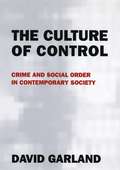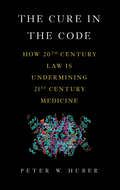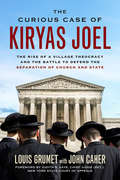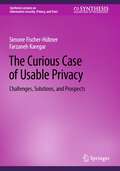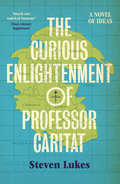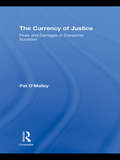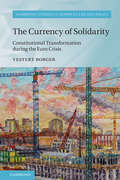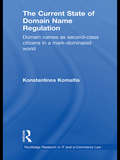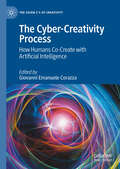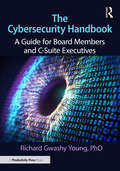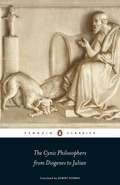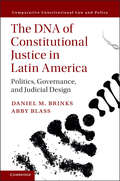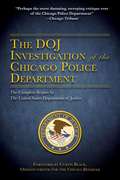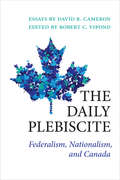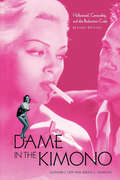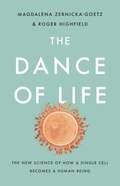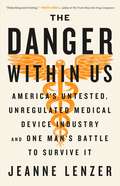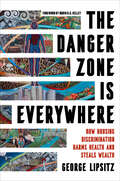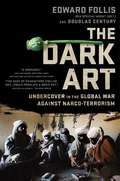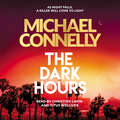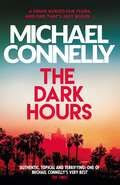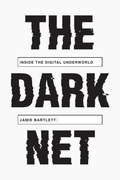- Table View
- List View
The Culture of Control: Crime and Social Order in Contemporary Society
by David GarlandThe past 30 years have seen vast changes in our attitudes toward crime. More and more of us live in gated communities; prison populations have skyrocketed; and issues such as racial profiling, community policing, and "zero-tolerance" policies dominate the headlines. How is it that our response to crime and our sense of criminal justice has come to be so dramatically reconfigured? David Garland charts the changes in crime and criminal justice in America and Britain over the past twenty-five years, showing how they have been shaped by two underlying social forces: the distinctive social organization of late modernity and the neoconservative politics that came to dominate the United States and the United Kingdom in the 1980s. Garland explains how the new policies of crime and punishment, welfare and security--and the changing class, race, and gender relations that underpin them--are linked to the fundamental problems of governing contemporary societies, as states, corporations, and private citizens grapple with a volatile economy and a culture that combines expanded personal freedom with relaxed social controls. It is the risky, unfixed character of modern life that underlies our accelerating concern with control and crime control in particular. It is not just crime that has changed; society has changed as well, and this transformation has reshaped criminological thought, public policy, and the cultural meaning of crime and criminals. David Garland'sThe Culture of Controloffers a brilliant guide to this process and its still-reverberating consequences.
The Culture of Control: Crime and Social Order in Contemporary Society
by David GarlandThe past 30 years have seen vast changes in our attitudes toward crime. More and more of us live in gated communities; prison populations have skyrocketed; and issues such as racial profiling, community policing, and "zero-tolerance" policies dominate the headlines. How is it that our response to crime and our sense of criminal justice has come to be so dramatically reconfigured? David Garland charts the changes in crime and criminal justice in America and Britain over the past twenty-five years, showing how they have been shaped by two underlying social forces: the distinctive social organization of late modernity and the neoconservative politics that came to dominate the United States and the United Kingdom in the 1980s. Garland explains how the new policies of crime and punishment, welfare and security—and the changing class, race, and gender relations that underpin them—are linked to the fundamental problems of governing contemporary societies, as states, corporations, and private citizens grapple with a volatile economy and a culture that combines expanded personal freedom with relaxed social controls. It is the risky, unfixed character of modern life that underlies our accelerating concern with control and crime control in particular. It is not just crime that has changed; society has changed as well, and this transformation has reshaped criminological thought, public policy, and the cultural meaning of crime and criminals. David Garland's The Culture of Control offers a brilliant guide to this process and its still-reverberating consequences.
The Cure for Obamacare
by Sally C. PipesThis Broadside will look at the changes that can be made to halt the full implementation of the law over the next few years, including repealing parts of the act that are unpopular with members of both parties. These parts are the medical device tax, IPAB, the new 3.8 percent tax on unearned income, to name a few.Also covered will be potential reforms to Medicare and Medicaid, two major entitlement programs that, if not reformed to ensure sustainability for those who really need these programs, will be bankrupt by 2024. There are a number of important lawsuits that will come before the courts this year on issues such as the exchanges, employer and individual mandates, and the contraception mandate. These will be highlighted and their potential impact on the law will be discussed.Finally, there is the issue of defunding the Medicaid expansion and the federal tax subsidies which, unless changed, will add tremendously to the cost of health care in this country. With the current fiscal crisis, these programs must be scaled back.Like welfare reform, the battle to bring about meaningful health care reform is a long-term fight. We must not give up. The election of 2016 will be very important for the future direction of health care. A reform plan will be offered. If Obamacare is not repealed and replaced, the U.S. will be on the road to a single-payer, "Medicare for All" system such as exists in Canada. We, too, will face long waiting lists, rationed care, and a lack of access to the latest technology and treatments. Examples will be given. America will be on the "Road to Serfdom" and there will be no off-ramp.
The Cure in the Code: How 20th Century Law is Undermining 21st Century Medicine
by Peter W. HuberNever before have two revolutions with so much potential to save and prolong human life occurred simultaneously. The converging, synergistic power of the biochemical and digital revolutions now allows us to read every letter of life's code, create precisely targeted drugs to control it, and tailor their use to individual patients. Cancer, diabetes, Alzheimer's and countless other killers can be vanquished-if we make full use of the tools of modern drug design and allow doctors the use of modern data gathering and analytical tools when prescribing drugs to their patients.But Washington stands in the way, clinging to outdated drug-approval protocols developed decades ago during medicine's long battle with the infectious epidemics of the past. Peter Huber, an expert in science, technology, and public policy, demonstrates why Washington's one-size-fits-all drug policies can't deal with diseases rooted in the complex molecular diversity of human bodies. Washington is ill-equipped to handle the torrents of data that now propel the advance of molecular medicine and is reluctant to embrace the statistical methods of the digital age that can. Obsolete economic policies, often rationalized as cost-saving measures, stifle innovation and suppress investment in the medicine that can provide the best cures at the lowest cost.In the 1980s, an AIDS diagnosis was a death sentence, until the FDA loosened its throttling grip and began streamlining and accelerating approval of life-saving drugs. The Cure in the Code shows patients, doctors, investors, and policy makers what we must now do to capture the full life-saving and cost-saving potential of the revolution in molecular medicine. America has to choose. At stake for America is the power to lead the world in mastering the most free, fecund, competitive, dynamic, and intelligent natural resource on the planet-the molecular code that spawns human life and controls our health.
The Curious Case of Kiryas Joel: The Rise of a Village Theocracy and the Battle to Defend the Separation of Church and State
by John M. Caher Judith S. Kaye Louis GrumetTwenty years ago, in the middle of the night and on the last day of the legislative session, the New York State Legislature created a publicly funded school district to cater to the interests of a religious sect called the Satmar, an insular group of Hasidic Jews that objects to, among other things, female school bus drivers. The rapidly growing sect had bought land in rural Upstate New York, populated it solely with members of its faction, and created a village called Kiryas Joel that exerted extraordinary political pressure over both political parties. Marking the first time in American history that a governmental unit was established for a religious group, the legislature's action prompted years of litigation that eventually went to the US Supreme Court.As today's Supreme Court signals its willingness to view a religious viewpoint like any other speech and accord it equal protection, the 1994 case, Board of Education of Kiryas Joel Village School District v. Grumet, stands as the most important legal precedent in the fight to uphold the separation of church and state. In The Curious Case of Kiryas Joel, plaintiff Louis Grumet opens a window onto the Satmar Hasidic community, where language, customs, and dress have led to estrangement from and clashes with neighboring communities, and details the inside story of his fight for the First Amendment and against New York's most powerful politicians.Informed by numerous interviews with key figures such as Governor George Pataki, media accounts, court transcripts, and more, The Curious Case of Kiryas Joel not only tantalizes with a peek at cynical power politics driven by votes and Supreme Court justice squabbling and negotiation; it also provides an important demonstration of how a small, insular, and politically savvy religious group can grasp legal and political power. This story—a blend of politics, religion, cultural clashes, and constitutional tension—is an object lesson in the ongoing debate over freedom of versus freedom from religion.
The Curious Case of Usable Privacy: Challenges, Solutions, and Prospects (Synthesis Lectures on Information Security, Privacy, and Trust)
by Simone Fischer-Hübner Farzaneh KaregarThis book journeys through the labyrinth of usable privacy, a place where the interplay of privacy and Human-Computer Interaction (HCI) reveals a myriad of challenges, solutions, and new possibilities. Establishing a solid understanding of usable privacy research, practices, and challenges, the book illuminates for readers the often shadowy corridors of such a multifaceted domain and offers guidelines and solutions to successfully traverse the challenging maze. The book does not simply focus on data protection or legislative frameworks but also on what it takes for privacy to be safeguarded, understood, embraced, and easily practiced by all. It begins with a thorough exploration of the background of privacy tools and technologies, the evolution of privacy rules and regulations, and the backdrop upon which this narrative unfolds. After establishing this context, its next important focus is the current state and future directions of the field, including thefrontiers of usable privacy research in relation to the Internet of Things (IoT), usability of PETs, and usable privacy for UX and software developers. The book also considers the often-overlooked privacy narratives of marginalized communities and delves into the complexities of user-centric privacy. Readers are provided with a blueprint for addressing these hurdles and establishing pathways for a more privacy-conscious world. The text will be of interest to students studying Computer Science, Information Systems, or Law, as well as researchers and practitioners working in the fields of usable privacy, privacy by design, Privacy-Enhancing Technologies (PETs), or HCI. All will benefit from the book’s central deliberation of a question that echoes through time and technological advancements: why does usable privacy matter?
The Curious Enlightenment of Professor Caritat
by Steven LukesThe Curious Enlightenment of Professor Caritat is a brilliant fictional journey through Western political philosophy by one of our most original thinkers. Professor Caritat, a middle-aged Candide, walks naively through the neighbouring countries of Utilitaria, Communitaria and Libertaria, in his quest to find the best of all possible worlds. Cut loose from the confines of his ivory tower, this wandering professor is made to confront the perplexed state of modern thinking in this dazzling comedy of ideas.From the Trade Paperback edition.
The Currency of Justice: Fines and Damages in Consumer Societies
by Pat O'MalleyFines and monetary damages account for the majority of legal sanctions across the whole spectrum of legal governance. Money is, in key respects, the primary tool law has to achieve compliance. Yet money has largely been ignored by social analyses of law, and especially by social theory. The Currency of Justice examines the differing rationalities, aims and assumptions built into money’s deployment in diverse legal fields and sanctions. This raises major questions about the extent to which money appears as an abstract universal or whether it takes on more particular meanings when deployed in various areas of law. Indeed, money may be unique in that it can take on the meanings of punishment, compensation, denunciation or regulation. The Currency of Justice examines the implications of the ‘monetization of justice’ as life is increasingly regulated through this single medium. Money not only links diverse domains of law; it also links legal sanctions to other monetary techniques which govern everyday life. Like these, the concern with monetary sanctions is not who pays, but that money is paid. Money is perhaps the only form of legal sanction where the burden need not be borne by the wrongdoer. In this respect, this book explores the view that contemporary governance is less concerned with disciplining individuals and more concerned with regulating distributions and flows of behaviours and the harms and costs linked with these.
The Currency of Solidarity: Constitutional Transformation during the Euro Crisis (Cambridge Studies in European Law and Policy)
by Vestert BorgerIn their fight against the debt crisis, the European Union and its member states took measures that have profoundly changed the euro. It now differs fundamentally from when it was introduced by the Treaty of Maastricht. Surprisingly, this change has come about with hardly any formal amendment to the Union's 'basic constitutional charter', the Treaties. How, then, to understand it? This book argues that the constitution of the EU has transformed, which occurs when constitutions change without amendment. The transformation is characterized by a broadening of the currency union's stability conception from price stability to also financial stability. Using solidarity as a lens, the book conceptualises the unity of the member states and analyses how this was preserved during the crisis. Subsequently, it explains how that changed the currency union's set-up and why the European Court of Justice could not turn against the change in Pringle and Gauweiler.
The Current State of Domain Name Regulation: Domain Names as Second Class Citizens in a Mark-Dominated World (Routledge Research in Information Technology and E-Commerce Law)
by Konstantinos KomaitisIn this book Konstantinos Komaitis identifies a tripartite problem – intellectual, institutional and ethical – inherent in the domain name regulation culture. Using the theory of property, Komaitis discusses domain names as sui generis ‘e-property’ rights and analyses the experience of the past ten years, through the Uniform Domain Name Dispute Resolution Policy (UDRP) and the Anticybersquatting Consumer Protection Act (ACPA). The institutional deficit he identifies, generates a further discussion on the ethical dimensions in the regulation of domain names and prompts Komaitis to suggest the creation of an environment based on justice. The relationship between trademarks and domain names has always been contentious and the existing institutions of the UDRP and ACPA have not assisted in alleviating the tension between the two identifiers. Over the past ten years, the trademark community has been systematic in encouraging and promoting a culture that indiscriminately considers domain names as secondclass citizens, suggesting that trademark rights should have priority over the registration in the domain name space. Komaitis disputes this assertion and brings to light the injustices and the trademark-oriented nature of the UDRP and ACPA. He queries what the appropriate legal source to protect registrants when not seeking to promote trademark interests is. He also delineates a legal hypothesis on their nature as well as the steps of their institutionalisation process that we need to reverse, seeking to create a just framework for the regulation of domain names. Finally he explores how the current policies contribute to the philosophy of domain names as second-class citizens. With these questions in mind, Komaitis suggests some recommendations concerning the reconfiguration of the regulation of domain names.
The Cyber-Creativity Process: How Humans Co-Create with Artificial Intelligence (The Seven C’s of Creativity)
by Giovanni Emanuele CorazzaThis edited book explores the process of creating using the seven C's of creativity framework. It discusses the creative process as a collaboration between humans and Artificial Intelligence (AI), here identified as the cyber-creativity process. Through nine chapters written by leading scholars in the field, this collection delves into the rapidly emerging area of Generative-AI (Gen-AI) applications and sheds light on the parts of the creative process that will remain fundamentally human throughout the foreseeable future, as well as those that will benefit more from AI-augmentation. Drawing on the dynamic definition of creativity, the contents encompass the Dynamic Universal Creative Process (DUCP) and the DA VINCI model, the design principles of Gen-AI algorithms, the cyber-creativity process in education, journalism, design, fashion, music, and its implications on intellectual property protection. A timely reflection on the complex and evolving relation between creativity and technology, this volume will interest academics, researchers, and students alike across humanities, social and hard sciences.
The Cybersecurity Handbook: A Guide for Board Members and C-Suite Executives
by Richard Gwashy Young, PhDThe workplace landscape has evolved dramatically over the past few decades, and with this transformation comes an ever-present threat: cybersecurity risks. In a world where digital incidents can lead to not just monetary loss but also reputational damage and legal ramifications, corporate governance must adapt. "The Cybersecurity: A Handbook for Board Members and C-Suite Executives " seeks to empower Board members and C-Suite executives to understand, prioritize, and manage cybersecurity risks effectively. The central theme of the book is that cybersecurity is not just an IT issue but a critical business imperative that requires involvement and oversight at the highest levels of an organization. The argument posits that by demystifying cybersecurity and making it a shared responsibility, we can foster a culture where every employee actively participates in risk management. "Cybersecurity: A Handbook for Board Members and C-Suite Executives," which aims to provide essential insights and practical guidance for corporate leaders on effectively navigating the complex landscape of cybersecurity risk management. As cyber-threats continue to escalate in frequency and sophistication, the role of board members and C-suite executives in safeguarding their organizations has never been more critical. This book will explore the legal and regulatory frameworks, best practices, and strategic approaches necessary for fostering a robust cybersecurity culture within organizations. By equipping leaders with the knowledge and tools to enhance their oversight and risk management responsibilities, we can help them protect their assets and ensure business resilience in an increasingly digital world.
The Cynic Philosophers: from Diogenes to Julian
by Lucian Diogenes of Sinope Emperor Julian'Poverty does not consist in the want of money,' I answered, 'nor is begging to be deplored. Poverty consists in the desire to have everything, and through violent means if necessary'From their founding in the fifth century BC and for over 800 years, the Cynic philosophers sought to cure humanity of greed and vice with their proposal of living simply. They guaranteed happiness to their adherents through freedom of speech, poverty, self-sufficiency and physical hardiness. In this fascinating and completely new collection of Cynic writing through the centuries, from Diogenes and Hipparchia, to Lucian and the Roman emperor Julian, the history and experiences of the Cynic philosophers are explored to the full.Robert Dobbin's introduction examines the public image of the Cynics through the ages, as well as the philosophy's contradictions and how their views on women were centuries ahead of their time. This edition also includes notes on the text, chronology, glossary and suggested further reading.Translated, edited and with an introduction by Robert Dobbin
The DNA of Constitutional Justice in Latin America: Politics, Governance, and Judicial Design (Comparative Constitutional Law And Policy )
by Daniel M. Brinks Abby BlassIn recent times there has been a dramatic change in the nature and scope of constitutional justice systems in the global south. New or reformed constitutions have proliferated, protecting social, economic, and political rights. <P><P>While constitutional courts in Latin America have traditionally been used as ways to limit power and preserve the status quo, the evidence shows that they are evolving into a functioning part of contemporary politics and a central component of a system of constitutional justice. <P>This book lays bare the political roots of this transformation, outlining a new way to understand judicial design and the very purpose of constitutional justice. Authors Daniel M. Brinks and Abby Blass use case studies drawn from nineteen Latin American countries over forty years to reveal the ideas behind the new systems of constitutional justice. They show how constitutional designers entrust their hopes and fears to dynamic governance systems, in hopes of directing the development of constitutional meaning over time.
The DOJ Investigation of the Chicago Police Department: The Complete Report by The United States Department of Justice
by Department of Justice Curtis Black“Perhaps the most damning, sweeping critique ever of the Chicago Police Department.” —Chicago Tribune Chicago, 2016. In a time of civil unrest in America, when racism, brutality, and division have taken prominent places in the daily news, the federal government conducted an investigation into the affairs of the Chicago Police Department. It is only one of many instances where the federal government has issued investigations of law enforcement across the nation before President Obama’s term expired. In a searing report, the department of justice examines Chicago’s law enforcement officers and officials for period of nearly thirteen months, digging to uncover moral and legal infractions committed within the department. Revealed is a pattern of aggression, lack of training, excessive use of force, racism and racial profiling, among other misconduct. Read the report in its entirety here. This edition is sure to provide readers with eye-opening insight into an epidemic of injustice and oppression across a divided nation.
The Daily Plebiscite: Federalism, Nationalism, and Canada (Political Development: Comparative Perspectives)
by David CameronFrom the mid-1960s through the mid-1990s, Canada was in a state of ongoing political crisis. Within this thirty-year period, David R. Cameron was an active participant and observer of Canada’s crisis of national unity. As a political scientist and former senior public servant, Cameron remains one of the most astute and respected analysts of Canadian federalism. This volume assembles some of Cameron’s best works on federalism, nationalism, and the constitution, including journal articles, book chapters, speeches, newspaper op-eds, and unpublished opinion pieces spanning nearly fifty years of engagement. In addition, The Daily Plebiscite includes a conversation between Cameron and Robert C. Vipond on the "long decade" of the 1980s in Canadian constitutional politics, a brief history of the mega-constitutional era, and concluding reflections on the broader lessons that other divided societies might take from the Canadian experience. Providing rich fare for anyone interested in questions of federalism, nationalism, and constitutionalism, The Daily Plebiscite offers an informed, insider’s perspective on the national unity question and considers the challenges faced by a federal, multinational, and multicultural country like Canada.
The Dame in the Kimono: Hollywood, Censorship, and the Production Code
by Leonard J. Leff Jerold L. Simmons“This excellent, lively study examines the ‘raucous debate’ sparked by the Code over the morals and ideals of American movies.” —Publishers WeeklyThe new edition of this seminal work takes the story of the Production Code and motion picture censorship into the present, including the creation of the PG-13 and NC-17 ratings in the 1990s.Starting in the early 1930s, the Production Code Director, Joe Breen, and his successor, Geoff Shurlock, understood that American motion pictures needed enough rope—enough sex, and violence, and tang—to lasso an audience, and not enough to strangle the industry. To explore the history and implementation of the Motion Picture Production Code, this book uses 11 movies: Dead End, GoneWith the Wind, The Outlaw, The Postman Always Rings Twice, The Bicycle Thief, Detective Story, A Streetcar Named Desire, The Moon Is Blue, The French Line, Lolita, and Who’s Afraid of Virginia Woolf? The authors combine a lively style with provocative insights and a wealth of anecdotes to show how the code helped shape American screen content for nearly 50 years.“A readable, intimate account of the rise to near-tyrannical power, and the fall to well-deserved ignominy, of the old Production Code Administration.” —Atlantic Monthly“A valuable insight into our own innocence and naiveté.” —The New York Times Book Review“The triumph of Leff and Simmons’s fine work is that they have reminded us of how fatuous and inimical a code of conduct can be: how tempting it is as a theoretical answer, and how intrinsically flawed it is as a working solution.” —The Times of London
The Dance of Life: The New Science of How a Single Cell Becomes a Human Being
by Roger Highfield Magdalena Zernicka-GoetzA renowned biologist's cutting-edge and unconventional examination of human reproduction and embryo research Scientists have long struggled to make pregnancy easier, safer, and more successful. In The Dance of Life, developmental and stem-cell biologist Magdalena Zernicka-Goetz takes us to the front lines of efforts to understand the creation of a human life. She has spent two decades unraveling the mysteries of development, as a simple fertilized egg becomes a complex human being of forty trillion cells. Zernicka-Goetz's work is both incredibly practical and astonishingly vast: her groundbreaking experiments with mouse, human, and artificial embryo models give hope to how more women can sustain viable pregnancies. Set at the intersection of science's greatest powers and humanity's greatest concern, The Dance of Life is a revelatory account of the future of fertility -- and life itself.
The Danger Within Us: America's Untested, Unregulated Medical Device Industry and One Man's Battle to Survive It
by Jeanne Lenzer"Before you get anything implanted in your body, read this book." - Shannon Brownlee, author of OvertreatedDid you know...- Medical interventions have become the third leading cause of death in America.- An estimated 10 percent of Americans are implanted with medical devices -- like pacemakers, artificial hips, cardiac stents, etc.- The overwhelming majority of high-risk implanted devices have never undergone a single clinical trial. In THE DANGER WITHIN US, award-winning journalist Jeanne Lenzer brings these horrifying statistics to life through the story of one working class man who, after his "cure" nearly kills him, ends up in a battle for justice against the medical establishment. His crusade leads Lenzer on a journey through the dark underbelly of the medical device industry, a fascinating and disturbing world that hasn't been written about before. What Lenzer exposes will shock readers: rampant corruption, elaborate cover-ups, shameless profiteering, and astonishing lack of oversight, all of which leads to dangerous devices (from artificial hips to pacemakers) going to market and into our bodies. In the vein of America's Bitter Pill and A Civil Action, THE DANGER WITHIN US is a stirring call for reform and a must-read for anyone who cares about the future of American healthcare. span
The Danger Zone Is Everywhere: How Housing Discrimination Harms Health and Steals Wealth (American Crossroads #73)
by George LipsitzCompellingly argues that good health is as much social as it is biological, and that the racial health gap and the racial wealth gap are mutually constitutive. The Danger Zone Is Everywhere shows that housing insecurity and the poor health associated with it are central components of an unjust, destructive, and deadly racial order. Housing discrimination is a civil and economic injustice, but it is also a menace to public health. With this book, George Lipsitz reveals how the injuries of housing discrimination are augmented by racial bias in home appraisals and tax assessments, by the disparate racialized effects of policing, sentencing, and parole, and by the ways in which algorithms in insurance and other spheres associate race with risk. But The Danger Zone Is Everywhere also highlights new practices emerging in health care and the law, emphasizing how grassroots community mobilizations are creating an active and engaged public sphere constituency promoting new forms of legislation, litigation, and organization for social justice.
The Dark Art
by Douglas Century Edward FollisA highly decorated veteran DEA agent recounts his incredible undercover career and reveals the shocking links between narcotics trafficking and terrorismWhat exactly is undercover? From a law-enforcement perspective, undercover is the art of skillfully eliciting incriminating statements. From a personal and psychological standpoint, it's the dark art of gaining trust--then manipulating that trust. In the simplest terms, it's playing a chess game with the bad guy, getting him to make the moves you want him to make--but without him knowing you're doing so. Edward Follis mastered the chess game--The Dark Art--over the course of his distinguished twenty-seven years with the Drug Enforcement Administration, where he bought eightballs of coke in a red Corvette, negotiated multimillion-dollar deals onboard private King Airs, and developed covert relationships with men who were not only international drug-traffickers but--in some cases--operatives for Al Qaeda, Hezbollah, Hamas, the Shan United Army, or the Mexican federation of cartels.Follis was, in fact, one of the driving forces behind the agency's radical shift from a limited local focus to a global arena. In the early nineties, the DEA was primarily known for doing street-level busts evocative of Miami Vice. Today, it uses high-resolution-optics surveillance and classified cutting-edge technology to put the worst narco-terror kingpins on the business end of "stealth justice" delivered via Predator drone pilots.Spanning five continents and filled with harrowing stories about the world's most ruthless drug lords and terrorist networks, Follis's memoir reads like a thriller. Yet every word is true, and every story is documented. Follis earned a Medal of Valor for his work, and coauthor Douglas Century is a pro at shaping and telling just this kind of story. The first and only insider's account of the confluence between narco-trafficking and terrorist organizations, The Dark Art is a page-turning memoir that will electrify you from page one.
The Dark Art
by Douglas Century Edward FollisA highly decorated veteran DEA agent recounts his incredible undercover career and reveals the shocking links between narcotics trafficking and terrorismWhat exactly is undercover? From a law-enforcement perspective, undercover is the art of skillfully eliciting incriminating statements. From a personal and psychological standpoint, it's the dark art of gaining trust--then manipulating that trust. In the simplest terms, it's playing a chess game with the bad guy, getting him to make the moves you want him to make--but without him knowing you're doing so. Edward Follis mastered the chess game--The Dark Art--over the course of his distinguished twenty-seven years with the Drug Enforcement Administration, where he bought eightballs of coke in a red Corvette, negotiated multimillion-dollar deals onboard private King Airs, and developed covert relationships with men who were not only international drug-traffickers but--in some cases--operatives for Al Qaeda, Hezbollah, Hamas, the Shan United Army, or the Mexican federation of cartels.Follis was, in fact, one of the driving forces behind the agency's radical shift from a limited local focus to a global arena. In the early nineties, the DEA was primarily known for doing street-level busts evocative of Miami Vice. Today, it uses high-resolution-optics surveillance and classified cutting-edge technology to put the worst narco-terror kingpins on the business end of "stealth justice" delivered via Predator drone pilots.Spanning five continents and filled with harrowing stories about the world's most ruthless drug lords and terrorist networks, Follis's memoir reads like a thriller. Yet every word is true, and every story is documented. Follis earned a Medal of Valor for his work, and coauthor Douglas Century is a pro at shaping and telling just this kind of story. The first and only insider's account of the confluence between narco-trafficking and terrorist organizations, The Dark Art is a page-turning memoir that will electrify you from page one.
The Dark Hours: The Brand New Blockbuster Ballard & Bosch Thriller
by Michael ConnellyThere's chaos in Hollywood on New Year's Eve. At the end of the countdown, LAPD Detective Renee Ballard seeks shelter from the traditional rain of lead as hundreds of revellers shoot their guns into the air. Minutes later, Ballard is called to a scene where a hardworking auto shop owner has been fatally hit by a bullet in the middle of a crowded street party. Ballard swiftly concludes that the deadly bullet could not have fallen from the sky and connects it with another unsolved murder - a case at one time worked by Detective Harry Bosch. Meanwhile, Ballard still hunts a fiendish pair of serial rapists, the Midnight Men, who have been terrorising women and leaving no trace. Finding herself up against deadly inertia and foundering morale in a police department ravaged by the pandemic and recent riots, Ballard must look outside to the one detective she can count on: Harry Bosch. But as the two determined detectives join forces, they cannot relax their guard. The brutal predators they track won't hesitate to kill to keep their secrets hidden. Unfolding with unstoppable drive and nail-biting intrigue, The Dark Hours shows that, 'Relentless on their own, Ballard's and Bosch's combined skills . . . could be combustible' (Los Angeles Times).
The Dark Hours: The Brand New Blockbuster Ballard & Bosch Thriller
by Michael ConnellyAS NIGHT FALLS, A KILLER COMES TO LIGHT...'An authentic, topical and terrifying thriller: one of Michael Connelly's very best.' THE TIMES'The Dark Hours is yet another superb thriller from a writer at the top of his game' SUNDAY EXPRESS 'Consistently excellent ... The plotting is as skilful as ever, and the pacing as relentless'MAIL ON SUNDAYOn New Year's Eve at the end of one of the hardest years in history, hundreds of revellers shoot their guns into the air in time-honoured LA tradition. But as the rain of lead comes down, a man is shot dead in the middle of a crowded street party.Detective Renée Ballard soon connects the bullet to an unsolved cold case last worked by legendary ex-LAPD detective Harry Bosch. As they investigate where the old and new cases connect, a new crime shatters the night shift.The Midnight Men are a pair of violent predators who stalk the city during the dark hours, and will kill to keep their identities secret.In a police department shaken to the core by pandemic and protests, both cases have the power to save Ballard's belief in the job - or take everything from her...* * * * *CRIME DOESN'T COME BETTER THAN CONNELLY.'One of the very best writers working today' Sunday Telegraph'The pre-eminent detective novelist of his generation' Ian Rankin'A superb natural storyteller' Lee Child'A master' Stephen King'Crime thriller writing of the highest order' Guardian'America's greatest living crime writer' Daily Express'A crime writing genius' Independent on Sunday
The Dark Net
by Jamie BartlettAn Independent and New Statesman Book of the YearBeyond the familiar online world that most of us inhabit--a world of Google, Facebook, and Twitter--lies a vast and often hidden network of sites, communities, and cultures where freedom is pushed to its limits, and where people can be anyone, or do anything, they want. This is the world of Bitcoin and Silk Road, of radicalism and pornography. This is the Dark Net.In this important and revealing book, Jamie Bartlett takes us deep into the digital underworld and presents an extraordinary look at the internet we don't know. Beginning with the rise of the internet and the conflicts and battles that defined its early years, Bartlett reports on trolls, pornographers, drug dealers, hackers, political extremists, Bitcoin programmers, and vigilantes--and puts a human face on those who have many reasons to stay anonymous.Rich with historical research and revelatory reporting, The Dark Net is an unprecedented, eye-opening look at a world that doesn't want to be known.m the Hardcover edition.
